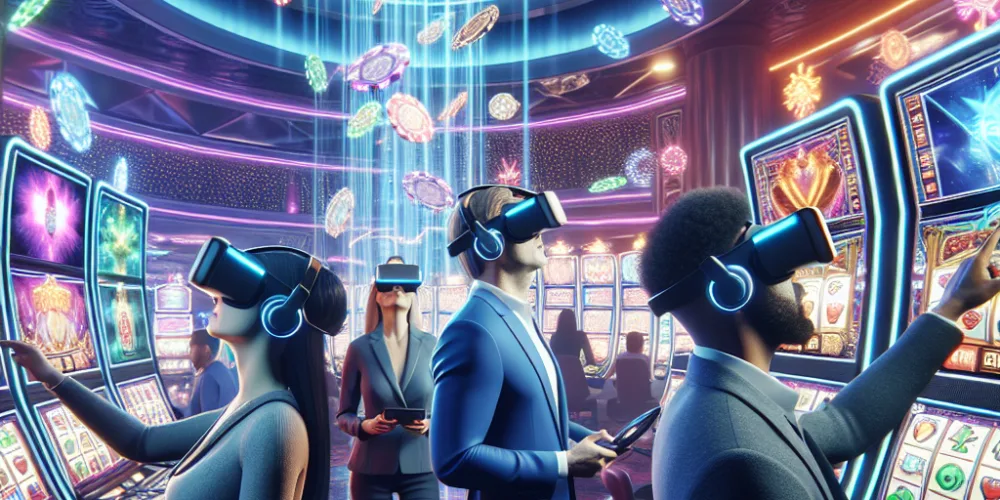In an era where technology continuously reshapes consumer experiences, the casino industry is not left behind. Traditional slot machines, with their bright lights and clanking coins, are undergoing a revolutionary transformation with the integration of Virtual Reality (VR) technology. This emergent trend is not just revamping the gaming floors but is also setting a new paradigm in how players engage with one of the most iconic casino games.
The concept of slot machines dates back to the late 19th century, and they have been a staple in casinos due to their simplicity and the excitement they offer. However, as gaming demographics shift and technological expectations rise, casinos are turning to VR to attract tech-savvy and younger players. This fusion of technology and traditional gaming is creating immersive experiences that were once the stuff of science fiction.
At the forefront of this innovation are casinos in technology hubs like Las Vegas and Macau, which are increasingly embedding VR technology into their slot machines. Players at these VR-enhanced slots don VR headsets and are transported into fully immersive 3D environments where they can interact with the game and its elements in ways traditional slots never allowed. From adventure-themed slot games that take you on quests to retrieve lost treasures, to engaging storylines where your choices influence the game’s outcome, the possibilities are endless.
The experience is about much more than spinning reels; it involves narratives that evolve, multi-player interaction, and a level of engagement that goes beyond mere chance. These interactive slots cater to a generation that seeks more than just passive entertainment, blending the thrill of video gaming with the excitement of casino gambling.
Interestingly, the integration of VR into slot machines does more than just enhance player experience. It also serves as a powerful marketing tool. Casinos are using these high-tech machines to draw crowds, boost long-term player loyalty, and differentiate themselves from competitors. In an increasingly crowded market, innovation is key to maintaining a competitive edge.
The financial implications for the casino industry are significant. According to a market analysis by Grand View Research, the global VR market is expected to grow exponentially, with applications in the gambling sector playing a crucial role. Casinos investing in VR technology are betting on not only increased foot traffic but also on setting new standards in casino gaming.
However, this shift is not without challenges. The cost of VR technology and the need for frequent updates can be daunting. Moreover, the integration of such advanced technology requires specialized skills and a new approach to game development. Casinos must balance the allure of high-tech investments with practical and financial realities.
Despite these hurdles, the trend towards VR-enhanced slot machines is gaining momentum. This is partly fueled by the gaming industry’s broader digital transformation and the increasing consumer demand for more engaging and interactive entertainment options.
The future of slot machines looks promising and is likely to be dominated by VR. As technology continues to evolve, the experiences offered by these machines will only become more sophisticated. For casino-goers, this means that a trip to the casino will no longer just be about gambling but about an immersive experience that could rival any video game or movie.
As the lines between different forms of entertainment continue to blur, the casino industry’s adoption of VR could serve as a blueprint for other sectors looking to innovate and engage with a new generation of consumers. The VR-enhanced slot machine is not just a new kind of gambling device; it is a harbinger of the future of entertainment, blending the virtual and real in ways that are as exciting as they are profitable.
In conclusion, the transformation of slot machines through VR technology represents a significant shift in the casino industry. It reflects broader changes in the entertainment landscape and points towards a future where technology and tradition merge to create new forms of engagement. As this trend continues, it will be fascinating to see how traditional gaming experiences evolve to meet the expectations of the modern consumer.

David Farbacu is a seasoned writer with a passion for games, gaming, casinos, and Xbox. With a wealth of experience in the industry, David brings insightful reviews, comprehensive guides, and engaging articles that cater to both casual gamers and hardcore enthusiasts. His expertise spans across various gaming platforms and genres, making him a go-to source for the latest trends and developments in the gaming world.

